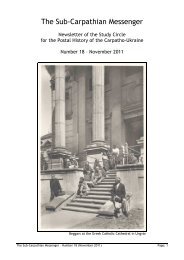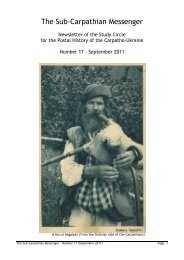The Sub-Carpathian Messenger - Jay T. Carrigan
The Sub-Carpathian Messenger - Jay T. Carrigan
The Sub-Carpathian Messenger - Jay T. Carrigan
Create successful ePaper yourself
Turn your PDF publications into a flip-book with our unique Google optimized e-Paper software.
Helmut KobelbauerRemarks and Thoughts on the Independent State Carpatho-UkraineYou may remember the article of Dr. Alexander Malycky in the SCM #005 and my comment. As wasto be expected, he did not agree with me; he didn’t want to add another comment of his own.Thinking through the reasons for my attitude, I would like to replicate two pieces of text for your(and his) kind consideration.<strong>The</strong> first is from an U. S. American diplomat, George F. Kennan, Secretary of Legation in Praguesince August 1938. One of his many duties was to observe and report on the developments in theCzechoslovak Republic. In a personal letter of December 8, 1938, he wrote:“As for the new regime itself which prevails in Prague and the historic provinces: to me itbears an ominous resemblance to the Schuschnigg regime which I knew in Austria in 1935.<strong>The</strong>re is the same disapproval of democracy, the same distrust and alienation of the laborelement, the same Catholic piety, the same moderate and decorous anti-Semitism, the samefutile hope of building up – without resorting to serious intimidation – an enthusiastic nationalmovement in a section of Europe where the dominant political reactions are incredulity,jealousy, and distrust. […]Slovakia and Ruthenia are, of course, another story. Neither people has the prerequisites foran independent political existence. <strong>The</strong>ir leaders have been completely won over by the Germansthrough flattery, cajolery, and display of force. <strong>The</strong>y are making awful fools of themselves;dressing up in magnificent fascist uniforms, flying to and fro in airplanes, drillingcomic-opera S. A. units and dreaming dreams of the future grandeur of the Slovak andUkrainian nations. Everything that the Czechs have tried to teach them during these twentyyears they have flung back into the Czechs’ faces. <strong>The</strong>y are momentarily happy in a falseautonomy which is rapidly destroying every possibility of a real national self-determinationfor decades to come.”This is a very sharp judgement, and Mr. Kennan obviously was a determined enemy of the fascistundertones in the political declarations from Bratislava and, later, from Chust/Khust. Still, onecannot help thinking that he was rather clairvoyant as concerned the actual developments in thenext few years.<strong>The</strong> second text throws some light on the attitude of the Ukrainian nationalists and especially theSitch in Khust in their relationship with the local Jews:“In the evening I was invited to dinner by [propaganda minister Volodymyr] Komarynsky in thelarge restaurant of the hotel [in Khust], which had been reopened only that morning. <strong>The</strong> hotelused to belong to a Jew, but the Sitch had forcibly pushed him and many others into Hungary.Between the fourth and the ninth of November [1938], when the Czechoslovak forces wereevacuating the districts that had to be ceded under the Vienna Award, they had rounded themup, packed them into lorries and forcibly dumped them into the area that was to becomeHungarian. Some of them were sent back when the Hungarians came in, others willingly orunwillingly stopped there. Having got rid of the owner of the Koruna, the Sitch took it overthemselves, to provide, so they said, a suitable hotel for visitors to Chust and a social centrewhere the officials and others could meet; in other words, one Aryan café and restaurant inChust where the new anti-Semitic ruling caste could meet without sacrificing their principles.”Would you understand now my strong reluctance to unequivocally embrace the Sitch and theirpolitical leaders?References:George F. Kennan: »From Prague After Munich«. Diplomatic Papers 1938 - 1940. Princeton University Press,Princeton (New Jersey), 1968, page 9.Michael Winch: »Republic for a Day«. An Eye-Witness Account of the Carpatho-Ukraine Incident. RobertHale Limited, London, 1939, pages 24-25.<strong>The</strong> <strong>Sub</strong>-<strong>Carpathian</strong> <strong>Messenger</strong> – Number 12 (September 2010) Page: 16













